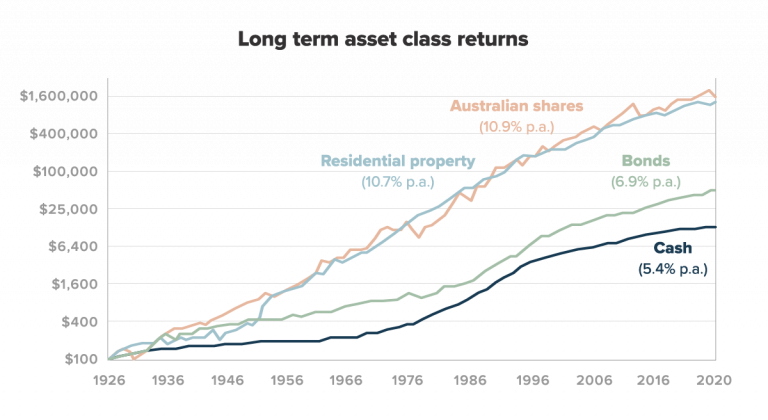Many Australians are intimidated by the share market. They find it confusing, daunting and fraught with risk. To get started in investing requires a leap of faith – but it needn’t be like that.
Memories of the Global Financial Crisis of 2007/8 are still quite raw for people, and it’s hard to forget the impact that it had on family and friends who lost money.
It’s an understandable response. Loss aversion, a psychological bias that sees losses felt twice as much as gains, is real.
However, when it comes to investing, that fear holds us back.
The refusal to take calculated risks because of fear of failure leads to missing out on huge potential upsides, especially when it comes to the stock market.
Investing in stocks is all about risk and reward, and the trick to it is not avoiding that risk but rather mitigating it.
Stockspot is all about risk and how to manage it. Our client journey starts, before anything else, with an analysis of the customer, their tolerance for risk and their time horizon.
From there, we recommend portfolios that suit how much risk an investor feels comfortable with, then check in regularly to keep things on track.
Read on and learn how to get started in investing with Stockspot.
Many Australians aren’t investing at all
A significant portion of Australians keep their personal savings in cash and term deposits.
While the stereotype might be an old lady with cash under her bed, it’s actually younger people who are the most likely to have their savings solely in cash.
In many ways, that’s not surprising: they were the ones who watched the financial system in crisis in their youth while, largely, not understanding what went on. They have the lowest financial literacy and the biggest likelihood of needing to access that cash quickly.
Yet they are also the generation who should be most ready to get started in investing. As they are young, they have the most to gain from compound interest, with decades to grow wealth in front of them.
Interest rates are a major talking point now after several years of cash rate rises, but these have not always been passed on to savers, as banks often institute deposit rules required to gain a rate that matches or beats inflation.
In practice, money in the bank is often not only not accumulating value, it is actually losing in it real terms as the cost of living goes up.
Compare that to the returns made investing in other types of assets over the past decade years.
Even factoring market falls such as that during the first stages of COVID, those who stayed the course earned a much better rate than those with their money in cash.

Shares have always recovered from short term falls
The post-pandemic recovery was predictable, because over the long run, shares have always recovered any short term falls and continued higher.
If you look at the graph of the Australian shares over the long run, the falls are blips in an otherwise consistently upwards trajectory.
The bank will keep your money safe, but the graph above shows you’re missing out on potential wealth creation that simply isn’t possible in a savings account.
Reduce investment risk with diversification
It’s your approach to investing that makes it less scary.
All the bluster around stocks that increases fear: the idea that you need to research stocks, understand how to calculate PE ratios and magically know when to buy or sell are some of the main culprits that lead people to think investing is daunting.
But that knowledge isn’t really required and, in some cases, can be counterproductive. Exchange traded funds (ETFs) provide an easy hack to access all that knowledge and let it work for you.
They’re simple funds that seek to track the market as closely as possible, allowing smart investors to let everyone else do the work while piggybacking on the profits.You can also reduce your fear by having the right mix of defensive investments like gold and bonds, which can provide a cushion to your portfolio when markets fall.
How tech can help you get started in investing
Advances in financial technology, known as fintech, have revolutionised how people invest. What was once complicated and expensive can now be made simple and relatively cheap.
Online investment advisors such as Stockspot – sometimes called robo advisers – utilise this tech to manage your investments online.
They provide advice, particularly through risk assessments, and then use algorithms to balance portfolios to constantly align with the desired level of risk.
Don’t be fooled by the ‘robo’ part, either: these are still human financial experts, only now, tehy can use the technology to do the part of the job that was once more expensive.
This means investing doesn’t have to be daunting or difficult because the investments and ongoing strategy are all automated.
Get started in investing
Taking your first foray into investing might be daunting, but anything worth doing in life involves some risk.
Investing helps you keep up with inflation and puts you on a path towards financial security.
All you need to do is focus on the long-term, avoid stock-picking, and minimise risk by diversifying your investments. Stick to these key principles and get going with Stockspot.





